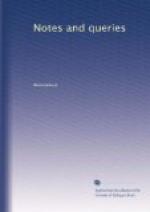P.H.F.
Luther’s Hymns.—“In the midst of life we are in death,” &c., in the Burial Service, is almost identical with one of Luther’s hymns, the words and music of which are frequently closely copied from older sources. Whence?
F.Q.
"Pair of Twises."—What was the article, carried by gentlemen, and called by Boyle (R.B.), in his Occasional Reflections (edit. 1669, p. 180.), “a pair of twises,” out of which he drew a little penknife?
P.H.F.
Countermarks on Roman Coin.—Several coins in my cabinet of Tiberius, Trajan, &c. bear the stamp NCAPR; others have an open hand, &c. I should be glad to know the reason of this practice, and what they denote.
E.S.T.
* * * * *
REPLIES.
GAUDENTIO DI LUCCA.
(Vol. ii., p. 247. 298.)
The Memoirs of Sig. Gaudentio di Lucca have very generally been ascribed to Bishop Berkeley. In Moser’s Diary, written at the close of the last century (MS. penes me), the writer says,—
“I have been reading
Berkeley’s amusing account of Sig. Gaudentio.
What an excellent system of
patriarchal government is there developed!”
See the Retrospective Review, vol iv. p. 316., where the work is also ascribed to the celebrated Bishop Berkeley.
EDWARD F. RIMBAULT.
In the corrigenda and addenda to Kippis’s Biographia Britannica, prefixed to vol. iii. is the following note, under the head of Berkeley:
“On the same authority [viz., that of Dr. George Berkeley, the bishop’s son,] we are assured that his father did not write, and never read through, the Adventures of Signor Gaudentio di Lucca. Upon this head, the editor of the Biographia must record himself as having exhibited an instance of the folly of building facts upon the foundation of conjectural reasonings. Having heard the book ascribed to Bishop Berkeley, and seen it mentioned as his in catalogues of libraries, I read over the work again under this impression, and fancied that I perceived internal arguments of its having been written by our excellent prelate. I was even pleased with the apprehended ingenuity of my discoveries. But the whole was a mistake, which, whilst it will be a warning to myself, may furnish an instructive lesson to others. At the same time, I do not retract the character which I have given of the Adventures of Signor Gaudentio di Lucca. Whoever was the author of that performance, it does credit to his abilities and to his heart.”
After this decisive testimony of Bishop Berkeley’s son, accompanied by the candid confession of error on the part of the editor of the Biographia Britannica, the rumour as to Berkeley’s authorship of Gaudentio ought to have been finally discredited. Nevertheless, it seems still to maintain its ground: it is stated as probable by Dunlop, in his History of Fiction; while the writer of a useful Essay on “Social Utopias,” in the third volume of Chambers’s Papers for the People, No. 18., treats it as an established fact.




